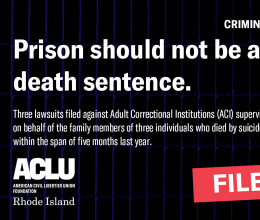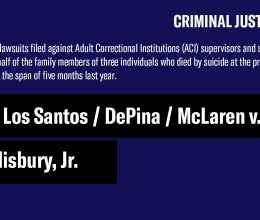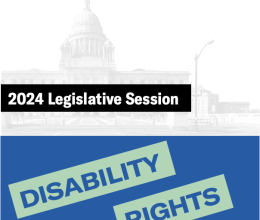Many of us will never personally understand the struggles of being part of this country’s penal system. Sure, we’ve all read stories about those who have been and presently are incarcerated around this country and the world, for that matter. It’s not a place anyone truly wants to be -- now imagine being there without the ability to communicate with those around you. This is life for the unknown number of deaf and deaf-blind inmates currently incarcerated.
Studies have shown that deaf individuals’ rights are consistently violated in all areas of the criminal justice system. It can start with the very first interaction with police, who in many cases do not have the proper training to respond to a call either by someone who is deaf or involving someone who is deaf, and continues as they move within the justice system. Deaf inmates also present very real communication issues, as well as safety issues (theirs, not for others).
Despite the existence of language in the Americans with Disabilities Act (ADA) requiring state and local agencies to make sure disabled persons can communicate as effectively as anyone else and a mandate by the Department of Justice that public agencies put in place plans to accommodate inmates with disabilities to prevent barriers to access of services and programs, the reality is that many institutions are simply not in compliance with the law. For example, an agency may move a program to a room accessible to inmates of all physical abilities, but that does nothing for someone who is deaf and unable to attend because there is no means by which they can communicate. This is often the case when it comes to classes that can be used towards early release. Rules and policies must take into account all disabilities, not just the ones that can physically be seen.
Deaf inmates also have difficulty communicating with fellow inmates, prison guards, doctors, counselors and family members. Most of us have an understanding that the life of an inmate is scheduled with very little room to stray from that schedule. If you can’t hear, you are unable to hear important announcements made over intercoms; you may miss the meal announcements; you are unable to hear if there is a safety concern; or if you have a visitor to see you. These make every day life even more difficult.
The simple act of making a telephone call takes extra long for inmates with hearing issues. Text Telephones (TTY) are not readily available in most cases, and inmates often times have to put in a request to use one. For those facilities that do have them, the Department must not only provide the device, but also modify the amount of time inmates have to make calls to provide sufficient time for use. Deaf inmates should also be afforded the same opportunities that hearing inmates have when it comes to telephone use, but there have been reported cases of day and time restrictions for TTY use – a direct violation of ADA. There have also been cases where relay services, which enable communication between a deaf or hard of hearing person and a person who uses a telephone have been prohibited, also a direct violation of ADA and Title IV.
Deaf individuals, not just inmates, often have limited proficiency in written and spoken English; their man form of communication is through sign language. There have been documented accounts of correctional officers not allowing the use of sign language for “security” reasons. The reasoning behind this ban is often out of fear that the officers’ inability to hear the conversation leads to a security issue. Inmates communicating in sign language could be plotting out an escape plan, or other security issues. In denying deaf inmates the use of their only means of communication in most cases only isolates them more than they already are.
The biggest issue deaf inmates face, outside of communication issues, and the overall lack of understanding that deaf inmates face within the corrections system, is the lack of safety and security. Being incarcerated is difficult for anyone; move too quickly, look at the wrong person, fail to acknowledge someone speaking to you, can create situations that can escalate quickly. For deaf inmates, this is a 24/7/365 problem. Most of the time deaf inmates are in facilities that do not have separate units for inmates with disabilities, so they are forced into general population. People can forget that you are deaf and become angry when you don’t respond to them. When you lack the ability to hear, you don’t know if someone will attack you from behind. Guards often question their impairment or taunt them. If prison wasn’t a scary enough place to be as an able bodied prisoner, it is that much scarier as someone with a disability.
There are several agencies around the country working to improve the conditions for the deaf prison population. Visit www.aclu.org/deafrights or one of our partners, HEARD, for more information.








